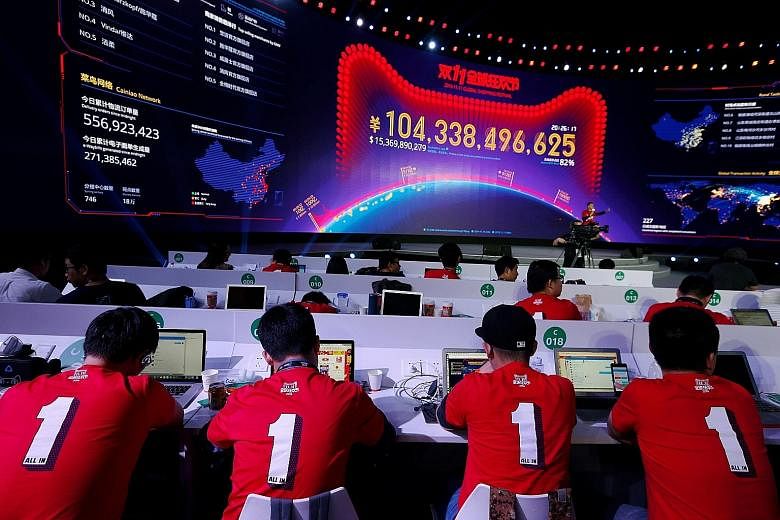Chinese e-commerce sites have set new records in an annual shopping extravaganza as consumers put up a showing of sustained purchasing power despite China's slowing economy.
By 3pm yesterday, the total turnover for e-commerce giant Alibaba had reached 91.2 billion yuan (S$18.9 billion), surpassing its total takings for the entire day last year. It had crossed the 100 billion yuan mark by 7pm.
Analysts say total sales for Alibaba alone could reach a record high of more than 135 billion yuan by the end of the 24-hour sale period.
Known as Singles' Day, the festival on Nov 11 is the most important date on China's retail calendar, with some saying it could indicate the state of the Chinese economy.
Alibaba turned the festival - supposedly created by university students in the 1990s to celebrate their bachelorhood - into a 24-hour sale in 2009. It has since morphed into a social phenomenon, with other e-commerce players and brick- and-mortar shops joining in the fray to offer deep discounts on the day or in the lead-up to the day.
But sales on Alibaba's platforms, like Taobao and T-mall, are most closely watched as the e-commerce market leader has a share of about 70 per cent of China's online market.
According to Xinhua news agency, other e-commerce sites such as JD.com, Gome and Suning.com exceeded previous records in the first few hours of the day.
With the ease of mobile payments, most Chinese consumers are using their phones to shop. Alibaba said 82 per cent of its sales yesterday were transacted through its mobile apps.
Avid online shopper Wang Xiaobai, 46, said she does her shopping on both the phone and computer, depending on which offers her the best deal. "It's cheaper to buy on the mobile app for JD.com," said the administrative manager of a university. Yesterday, she spent around 2,000 yuan on items such as clothes, toilet paper, detergent and snacks. "Though there could be cases where the retailers give fake discounts, I still love shopping on Double 11 (another name for Singles' Day). I could save at least 20 per cent compared with normal days," she added.
Given the scale of this annual event, Chinese regulators have started paying attention to fraudulent practices by e-retailers.
Earlier this week, the State Administration for Industry and Commerce said it met all the major e-commerce players to warn them against selling fakes, inflating sales figures and giving fake discounts - a practice where sellers raise prices ahead of Nov 11 and then lower them on the day of the festival.
Analysts say the record-breaking online sales may not be predictive of the overall consumption growth trend. Official statistics show that retail sales grew 10.4 per cent for the first nine months of this year. "People are shifting their consumption from offline to online, and also from other periods of the year to this day of the year," said marketing professor Jing Bing of the Cheung Kong Graduate School of Business.
Dr Jing noted that there are significantly more international brands taking part in the event this year, an indication of the growing sophistication of Chinese consumers.
"Before, it was a case of buying something that you didn't have. Now, it's a matter of getting a better version of what you already have."
•Additional reporting by Lina Miao

